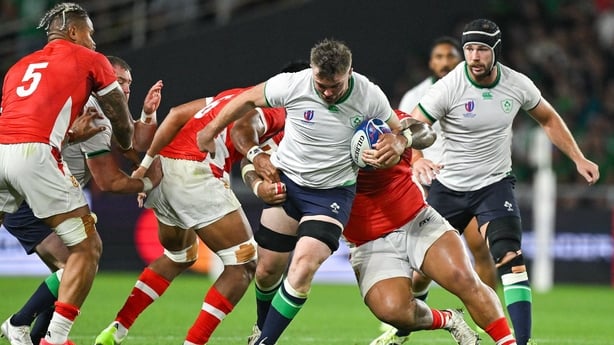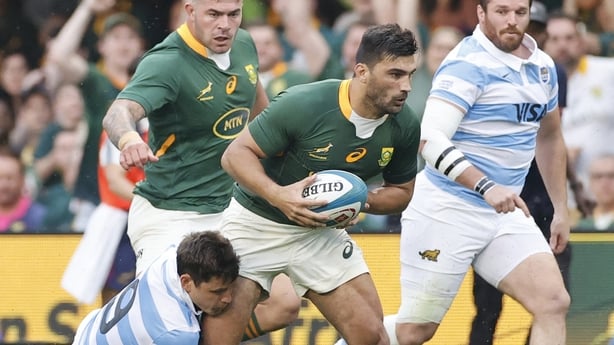A resounding win over Tonga will have pleased Ireland head coach Andy Farrell, but heading into Saturday's crunch match with South Africa, two areas will need close attention; the penalty count and the breakdown.
In round one, every team that conceded more than 10 penalties lost the game. In one of the most anticipated games of the World Cup, France only conceded four penalties against New Zealand.
The penalty count is a reflection of your team discipline and decision making, as well as the swing of pressure within the game.
When you’re under pressure, players have less time to make decisions around the breakdown, less time to get off the line in defence so they’re scrambling more and generally play more of the game in their own half.
Ireland conceded an average of 8.8 penalties per game across the 2023 Six Nations on their way to a Grand Slam. For more context, Scotland conceded 10 against South Africa and were never in the game.
The Springboks are one of the best sides at applying pressure in different ways. Whether they want to squeeze the opposition with a kick pressure strategy, or increase the pace with their attacking game, they will cause havoc if Ireland are to concede 10+ penalties like they did against Tonga.

Penalties either mean easy exits for the opposition out of their own half, or easy entries towards your 22 metre line, both of which would have a serious impact on any game.
The second area that could be worrying for Ireland is their attacking breakdown.
Notwithstanding the lowly opposition, Ireland enjoyed the fastest ruck speed in the tournament in the opening round.
Farrell’s men had the fastest ruck speed in the 2022 Six Nations, second best in this year’s competition to Italy.
You can see the way Ireland play the game that the ruck holds huge value by creating fast ball, and the ensuing chaos for the opposition. There’s more nuance to this than just piling into attacking breakdowns.
Ireland have a lot of clarity in their gameplan and attacking structures, meaning they are more often than not on the front foot.
Support players generally arrive early at the breakdown to stop the contest, which allows the scrum-half to whip the ball away as fast as possible. That has a compounding effect on the opposition defence because they’re scrambling more often and it creates more gaps in attack for Ireland.
As clear as that can be on a good day for the Irish attack, Tonga still spoiled Ireland’s attacking platform on a number of occasions.
They turned the men in green over in the first attacking play of the game by sending a poacher to the breakdown where Caelan Doris had carried. In that instance, there was a knock-on somewhere along the way but the ruck pressure didn’t stop there.
Highlights of Ireland's win over Tonga
After Mack Hansen’s monster 50:22 early in the game, Tonga disrupted the flow yet again with a penalty in the breakdown on a Tadhg Beirne carry. It was the second attacking platform in the opening quarter where Ireland lost their rhythm due to the opposition disrupting their ball.
Despite Tonga losing the penalty exchanges in the opening quarter, both their penalties received were for poaches at the breakdown. There was at least one other poach penalty in the second half, despite Ireland’s dominance, and another turnover for Tonga in the breakdown without the resulting penalty in the first half.
South Africa will be looking at that game thinking there’s an opportunity to throw everything at the breakdown in an attempt to disrupt the Irish attack, which has been so potent in the last year.
Rassie Erasmus and Jacques Nienaber are two of the greatest tacticians in the game. Their ingenuity in a one-off game is unmatched and I have no doubt that the breakdown is one area where they’ll throw a spanner in the works.
It would have been in the making for quite some time too, with Ireland’s dominance in the world rankings and with the early pool draw giving teams a chance to figure out their opposition.
The world champions also rested some starters from the Scotland game. They’ve been known to split their squad in the past to double down on preparation for a game ahead.

The likes of Pieter-Steph Du Toit, Damian De Allende, Mannie Libbok, Siya Kolisi, and Franco Mostert and others could have been analysing Ireland for the whole week when others were preparing for the Romania game.
With that said, Farrell and backs coach Mike Catt have their own creativity in attack which can lead to tries, as it did for the Tadhg Beirne and Johnny Sexton tries last Saturday.
Ireland know how to manipulate set-piece and phase play situations to make the opposition defence vulnerable and they’ve had a chance to analyse South Africa as well after the Scotland game.
It’s going to be a top class tactical battle between two of the form sides in the world, a showdown that we’ve been waiting months for.
Ireland simply must brush up on their penalty count and breakdown accuracy if they’re to gain control of Pool B.
Watch live coverage of Ireland v South Africa (Saturday, 8pm) on RTÉ2 and RTÉ Player, listen to live commentary on RTÉ Radio 1, and follow live updates on RTÉ Sport Online and the RTÉ News app.





